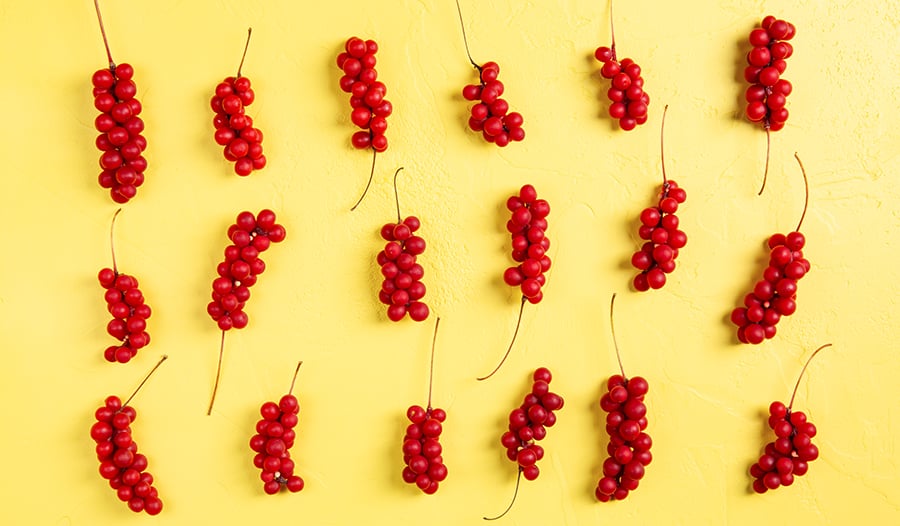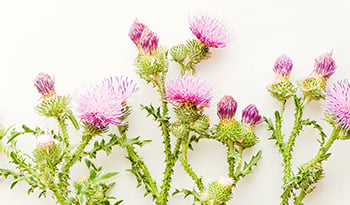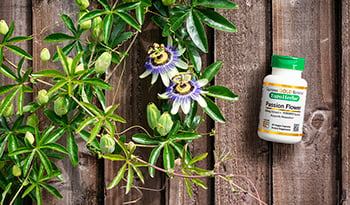Schisandra Berry Benefits: Liver Health, Cognitive Protection, and More
DISCLAIMER:This blog does not intend to provide diagnosis...
- In this article:
- What Is Schisandra (Wu Wei Zi)?
- Schisandra Benefits in Traditional Chinese Medicine
- Use in Traditional Chinese Medicine
- Schisandra and Cognitive Protection
- Schisandra and Sleep Benefits
- Schisandra and Kidney Function
- Schisandra and Cough Benefits
- How to Prepare Schisandra (Wu Wei Zi)
- Toxicity

What Is Schisandra (Wu Wei Zi)?
The Schisandra berry, known as Wu Wei Zi, may very well be the next super herb! This ancient berry has recently gained the attention of modern phytopharmacology due to its wide range of health benefits, including digestive, nervous, and immune system support.
The Schisandra berry is the fruit of the Schisandra plant, which is native to China, Russia, and Korea. This vine thrives in colder climates and grows vertically on stakes, like grape vines. The Schisandra plant grows for four to five years before you can harvest berries from it.
Many cultures have prized Schisandra for its medicinal properties. In Russia, the Schisandra berry is recognized as an adaptogen herb that can help combat cardiovascular issues, stress, and adrenal fatigue. In China, Schisandra has a long history of medicinal benefits.
High-quality Schisandra berry is a large fruit with thick, purplish-red, fleshy, and oily pulp and an intense aroma.
Schisandra Benefits in Traditional Chinese Medicine
In Traditional Chinese Medicine (TCM), Wu Wei Zi has profound health benefits throughout the body.
This herb is sometimes used alone but is often added into a formula with other herbs. As with other herbs, proper preparation and dosage of Schisandra is critical to effectively treat ailments—this may be just as important as choosing the appropriate herb for treatment.
In TCM, each body organ has a flavor attached to its function. Also known as “Five Flavored Seed,” the Schisandra berry benefits the five Yin organs:
- Spleen: sweet
- Liver: sour
- Heart: bitter
- Lungs: pungent
- Kidneys: salty
Each of these flavors helps balance the organ and, in turn, balance the body, mind, and spirit. The Grand Materia Medica explains, “Sourness and saltiness enter the Liver and tonify the Kidneys, acidity, and bitterness enter the heart and tonify the lungs, and sweetness enters the middle palace and augments the Spleen and stomach.”
Due to its many health benefits, Schisandra berry has been traditionally used for everything from stopping cough to thickening hair to stopping diarrhea. Wu Wei Zi is traditionally used as a cough suppressant and anti-diarrheal agent. Since TCM is an organ-pattern-based medicine, the Schisandra berry can impact the entire body.
Schisandra affects the sympathetic and central nervous systems, and the gastrointestinal, immune, endocrine, respiratory, and cardiovascular systems, through various mechanisms. Research suggests it helps combat oxidative stress, which can lower inflammation and prevent loss of healthy tissues and organs.
Schisandra releases fatty acids (arachidonic acid) into the bloodstream, positively affecting blood vessels, muscles, and anti-inflammatory compounds. It supports a stronger, healthier cardiovascular system by improving circulation while impacting blood cells, blood vessels, and soft tissue. Because of these remarkable health benefits, Schisandra can improve the body’s overall endurance, mobility, agility, fertility, stress management, and mental performance.
In TCM, the Schisandrae berry’s reputation for warming the body, stopping cough, boosting Liver function, calming the mind, and reinforcing kidney Qi places this herb high on the list of multifunctional medicinal herbs.
Use in Traditional Chinese Medicine
Wu Wei Zi is considered both an adaptogen and ergogenic herb. It is used in TCM to stimulate the central nervous system, protect the liver, and lower chronic disease risk.
Schisandra is classified in the category of Herbs that Stabilize and Bind. This category includes herbs for treating disorders in which bodily substances may discharge abnormally.
Wu Wei Zi is typically used to treat symptoms like diarrhea, breathing and lung issues, frequent or leaking urination, excessive sweating, dream-disturbed sleep, intense thirst, irritability, and forgetfulness—but it doesn’t address the root causes of these conditions. Because its nature contains and binds, Schisandra is contraindicated when there is internal stagnation of dampness or heat.
Schisandra and Cognitive Protection
Research suggests Schisandra berry may support neurogenerative activity. Schisandra contains polyphenols known as lignans, which may help treat various neurodegenerative diseases and offer other health benefits, like supporting liver health and estrogen balance. Schisandra may also excite the central nervous system, improving memory and learning while calming the mind.
In TCM, the brain is associated with the marrow. According to TCM, when the marrow is sufficiently full, the brain is nourished and allows learning and memory formation. The five yin organs—liver, spleen, lungs, kidneys, and heart—help nourish the brain.
The kidneys, in particular, contain the essence that nourishes the brain. When the essence is filled, the marrow is full; if the essence is depleted, the marrow is empty. Therefore, strengthening the kidney and boosting the essence are fundamental treatments for memory loss in Chinese medicine.
Modern research on the lignans in Schisandra suggests these phytochemicals offer memory-improving health benefits. In studies, Schisandra lignans improved Aβ 1-42-induced short-term and spatial memory impairments and cycloheximide-induced memory impairment in rats. They also improved the hippocampus region of the brain, which is responsible for learning, memory, and emotion.
The types of lignans found in Schisandra, known as dibenzocyclooctadiene lignans, may also enhance cognitive performance and protect against neuronal cell damage and Alzheimer’s Disease.
Additionally, Schisandra berry seed contains several organic acids and antioxidants that offer a variety of health benefits, including:
- Benzoic acid – antibacterial
- Citric acid – antibacterial and antiviral
- Malic acid – helps the body generate saliva
- Tartaric acid – aids digestion and may improve glucose tolerance
- Succinic acid – antibacterial
- Vitamin A – antioxidant
- Vitamin E – antioxidant
- Protocatechuic acid – antioxidant, antibacterial, anti-inflammatory, and analgesic
Schisandra and Sleep Benefits
In TCM, the heart is considered the king of all emotions and is responsible for a good night’s sleep. Schisandra is used in TCM to calm the heart Qi and may also help with palpitations and insomnia. It is traditionally included in an herbal formula to help prevent insomnia, balance emotions, and cope with anxiety.
Schisandra and Kidney Function
The Kidneys are considered “The Root of Life,” or the body’s engine, in TCM. They store our Qi, Kidney Yin, and Kidney Yang. Kidney Yin is the fundamental substance for birth, growth, and reproduction, while Kidney yang is the main force of all physiological processes.
Overall, the kidneys help to store life essence and govern birth, growth, reproduction, and development. They produce marrow and promote brain and bone development. The kidneys govern over the movement of water throughout the body and control the reception of Qi. The kidneys open into the ears and manifest on the hair. They also control willpower and motivation.
Schisandra berry can tonify the Kidney Qi, Yin, and Yang. It does this by boosting mitochondrial function in each cell, creating more energy for overall adrenal performance. It helps stop urinary leakage, spermatorrhea, vaginal discharge, and frequent urination due to kidney deficiency. Schisandra may also help stop diarrhea and encourage hair growth.
Schisandra and Cough Benefits
Schisandra is used in TCM for chronic cough and wheezing. In TCM, sour flavors help bind moisture to the lungs, helping nourish and soothe most lung irritations. Schisandra also stops leakage of Lung qi and enriches kidney yin, which can help improve coughs.
How to Prepare Schisandra (Wu Wei Zi)
Schisandra is typically prepared by dry-frying until its seeds are slightly scorched, though you can also steam and then sun-dry Schisandra berries. Schisandra berries are sometimes consumed mixed with honey and rice wine. However, you may find it most convenient to take Schisandra berry as a tablet or capsule.
Toxicity
While Schisandra is generally safe when taken at recommended doses, too much could lead to abdominal discomfort, burning, cold, or sore sensation in the abdomen, or reduced appetite. People who are allergic to Schisandra may experience rashes on their eyelids, backs of hands, chest, and lower back.
As with any herb or supplement, it’s a good idea to talk with your doctor before adding Schisandra to your regimen to make sure it is safe and doesn’t interact with other medications you are taking.
References:
- Panossian A, Wikman G. Pharmacology of Schisandra chinensis Bail.: an overview of Russian research and uses in medicine. J Ethnopharmacol. 2008;118(2):183-212. doi:10.1016/j.jep.2008.04.020
- Yuan R, Sun G, Gao J, et al. Schisandra Fruit Vinegar Lowers Lipid Profile in High-Fat Diet Rats. Evid Based Complement Alternat Med. 2020;2020:7083415. Published 2020 Sep 3. doi:10.1155/2020/7083415Research on Wu Wei Zi
- Wei B., Li Q., Fan R., et al. UFLC-MS/MS method for simultaneous determination of six lignans of Schisandra chinensis (Turcz.) Baill. in normal and insomniac rats brain micro dialysates and homogenate samples: towards an in-depth study for its sedative-hypnotic activity. Journal of Mass Spectrometry. 2013;48(4):448–458. doi: 10.1002/jms.3176
- Fole A., Miguens M., Higuera-Matas A., Alguacil L. F., Ambrosio E., Del Olmo N. Cocaine facilitates protein synthesis-dependent LTP: the role of metabotropic glutamate receptors. European Neuropsychopharmacology. 2014;24(4):621–629. doi: 10.1016/j.euroneuro.2013.10.013
- Szopa A, Dziurka M, Warzecha A, Kubica P, Klimek-Szczykutowicz M, Ekiert H. Targeted Lignan Profiling and Anti-Inflammatory Properties of Schisandra rubriflora and Schisandra chinensis Extracts. Molecules. 2018;23(12):3103. Published 2018 Nov 27. doi:10.3390/molecules23123103
- Duan H, Khan GJ, Shang LJ, et al. Computational pharmacology and bioinformatics to explore the potential mechanism of Schisandra against atherosclerosis. Food Chem Toxicol. 2021;150:112058. doi:10.1016/j.fct.2021.112058
- Ko KM, Chiu PY. Biochemical basis of the "Qi-invigorating" action of Schisandra berry (wu-wei-zi) in Chinese medicine. Am J Chin Med. 2006;34(2):171-176. doi:10.1142/S0192415X06003734

 By Dr. Debbie Kung, DAOM, LAc.
By Dr. Debbie Kung, DAOM, LAc.


